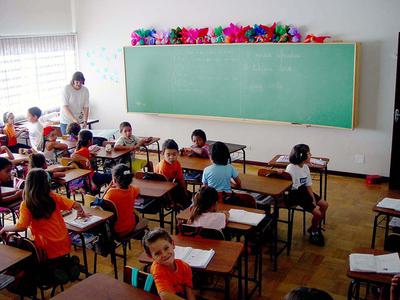Learning a Foreign Language Essays
by Dhruvisha Shah
(Ahmedabad, Gujarat, India)
Some experts believe that is better for children to begin learning a foreign language at primary school rather than secondary school.Do the advantages of this outweigh the disadvantages?
Traditionally, children begin studying foreign languages at secondary school. Many individual schools or educationalists have recommended to study foreign languages at an earlier stage. However this policy may bring some advantages along with some disadvantages. This essay will further discuss whether extending foreign language study to the primary stages is beneficial and if disadvantages may occur in the later stages.
Obviously young children pick up languages much more easily than teenagers. Their brains are programmed to learn their mother tongue which also facilitates learning another language. At a young age, children are enthusiastic to explore and to learn new things. The primary time table should allow more frequent shorter sessions for maintaining learner's enthusiasm and progress. Acquiring foreign languages can also help them to understand other cultures.
However, there are some disadvantages. Primary school teachers may not have the necessary language skills or they are not well trained for that particular languages. If any language specialist is called then the flexibility of sessions is diminished. Primary language teaching needs to be standardised, so that secondary schools do not face problems in their intake. Failing to undoes the earlier gains. In some situations, it would become very stressful to the child when he has to learn three languages i.e. native languages and foreign languages. Some researchers have shown from their studies that such children have difficulties in deciding which language to speak and may end up learning nothing,
In conclusion, a standardised policy can be adopted at primary schools which can also benefit society culturally and economically. Young children's grasping power can make these benefits more achievable.
***Please comment below on this learning a foreign language essay in order to advise this student on how to improve their IELTS score.
Learning a Language Abroad
by Phuc
(Vietnam)
Please check my writing and give me feedback. Thank you very much.
As a part of education, students should spend a period of time living in another country to learn its language and culture.
Do you agree or disagree?
It is said that living abroad would help improve your foreign language abilities and knowledge of another culture. According to my point of view, I partly agree with this opinion.
Firstly, while we live among people who use the language, we will have a chance to practice it all the time. Rarely can we find a native speaker in our hometown. To almost all students, they usually find it difficult with speaking and listening skills. These cannot easily be improved if we use it uncommonly.
Moreover, we may confront many situations which we have never faced up before. To deal with those difficulties after a few times, we will easily recognize the differences between the two cultures. Some factors are acceptable in our country but they are totally naughty in another one. For example, in many Asian nations, people usually ask about the others’ ages, work and also family; but to Western citizens, it is impolite to do so. These things are only taught while we stay in its culture.
On the other side, each country has each education system. To study in another language is a challenge. To get used to their teaching manner, which is totally different from ours, is more challenging. People studying abroad often get ‘culture shock’ while they are not accustomed to the new lifestyle and the new way they have to study.
Generally, living abroad is one of the best ways to learn the culture and language. But there are still some disadvantages. We have to overcome the shocks so that we can become proficient.
Click here to post comments
Join in and write your own page! It's easy to do. How? Simply click here to return to IELTS Essay Feedback Forum.
Learning Languages at Primary School (2)
by Abrar khan
(Sydney)
Some experts believe that it is better for children to begin learning a foreign language at primary school rather than secondary school?
Do the advantages of this outweigh the disadvantages?
The idea of whether children should be taught a foreign language at primary or secondary school is still debatable. Many people are of the opinion that it is more beneficial for a child to learn a second language at secondary school rather than primary. In this essay, I will attempt to explain the advantages and disadvantages of this view from my own personal perspective.
To begin with, a child's mind cannot absorb too many contents at primary school and bombarding him with words from two languages (native and foreign) may lead his mind into a state of confusion. A student studying at Class one for instance, who just started to talk in his mother tongue will face great difficulty in learning a second language. Thus, it would be more appropriate to teach such a child a second language at secondary school where his mind will be ready to learn a new language.
Secondly, in some situations, for instance in the case of an immigrant child, it would become very stressful for the child when he has to learn three languages (Native, Country Language, foreign language at school) simultaneously at primary school. In worse circumstances, as some researchers have shown from their studies, such children have difficulty in deciding which language to speak and may end up learning nothing. clearly, this child would face no difficulty if he is taught the third language at secondary school.
Other commentators are of the view that foreign languages should be taught at primary school as it will spark the interest of learning new languages in the child's mind and as he grows up, by the time he enters secondary school he might be able to communicate in the foreign language. The argument here is that if such language is taught at secondary school, most of the children will not take interest in learning and may find it unnecessary.
To recapitulate. children are mentally ready to learn a second language at secondary school and also suitable in circumstances where the child has to learn more languages. It is the responsibility of the child if he wants to continue learning this language after secondary school or not.
In conclusion, I believe that teaching a foreign language would be more appropriate at secondary level as its advantages clearly outweigh its disadvantages.
*****Please give me comments for my learning a foreign language at primary school essay.
Click here to post comments
Join in and write your own page! It's easy to do. How? Simply click here to return to IELTS Essay Feedback Forum.
Learning Languages at Primary School (3)
by budi
(indonesia)
Could anybody help me to assess my essay?
Some experts believe that it is better for children to begin learning a foreign language at primary school rather than secondary school.
Do the advantages of this outweigh the disadvantages?
The right time for children to learn second languages has been a riddle since society started thinking about global citizenship and opportunity, especially in countries whose first language is not English. Most professional in the field believed that it is best to start learning second language at primary school while other practitioner suggested that start to learn that in secondary school is more efficient. I believe that the best time to start learning second language is at primary school. It is due to the fact that for biological reason, it is more beneficial and children can have an early exposure to the language.
Medical research found out that the primordial part of the brain is responsible for emotional sensing, reflexive movement, and imitating ability. This imitating ability, which is developing significantly during primary school period, contributes significantly in language learning. On the other hand, logical thinking ability is developed later, that is during secondary school phase. This brain development knowledge is very fundamental information to support the idea that the best time to learn second language is during primary school.
Many language researchers, educators, and experts believed that each individual needs different time to absorb every aspect of new language learned such as grammar, vocabulary, and pronunciation.
This learning curve, which can not be accelerated, can only be balanced by starting it at early as possible. By doing so, children can get early exposure to the language. Thus, they also more get used to and are more confident in using it. For this reason, it is obvious that starting it early in primary school give children more benefits.
After compiling that brain development phase information about imitating ability that contributes to language training as well as the fact that getting early exposure that can give more advantages, it is clear that the best time to begin learning foreign language is at primary school.
Learning Languages at Primary School (4)
by Md Abu Bakar Siddiq
(Bangladesh)
Some experts believe that it is better for children to begin learning a foreign language at primary school rather than secondary school.
Do the advantages of this outweigh the disadvantages?
Learning a foreign language such as English is essential for our daily life, continued higher education, business, etc. But it’s a big controversy when to start it. Whether it should be initiated at primary level education or at secondary school level. I think it would be better to inaugurate learning another nation’s voice at primary level education.
If we organize our children to be taught a foreign language at primary school, they can catch and follow instructions regarding this easily. Furthermore, it is easier for them to remember this early period learning for a long-time, since at this tender age the brain remains fresh and sharp to follow any instructions. Along with this, children’s foundation on that particular language becomes stronger that ultimately makes them more interested about that nation.
Yet, some experts think differently. According to them, it is not wise making students’ interest about a second language before secondary level education. Firstly, it will put extra pressure on their brain. Secondly, this approach may make students reluctant about their mother language, which will hinder them to learn more about their culture, customs, and country as well.
But, I do not agree with these cheap, awkward opinions. This is because I don’t believe beginning foreign language learning at primary school will put that much of an enormous stress on the kids’ mind and body. If adequate measures are taken during teaching they can enjoy it. On the other hand, side by side teaching institutes should be cautious about their attitude toward the mother language.
So, it is crystal clear that learning another language along with the native one at primary level education has some added benefits over learning it at secondary school education.
***You can comment below on this learning a foreign language essay.
Click here to post comments
Join in and write your own page! It's easy to do. How? Simply click here to return to IELTS Essay Feedback Forum.
Learning Languages at Primary School (5)
by Rehmatullah Saeed
(Pakistan, Karachi)
Some experts believe that it is better for children to begin learning a foreign language at primary school rather than secondary school.
Do the advantages of this outweigh the disadvantages?
Some school of thoughts argue that a foreign language should be learnt in the primary school while others argue that this strategy would put extra amount of pressure on the innocent children and subsequently considering the importance, necessity and obligation of learning a foreign language then I strongly believe the thoughts of the first party.
Apparently the advantages of learning a foreign language in the primary level cross the minor number of disadvantages. Generally the age of childhood is very fresh and not any type of psychological pressure from their home and outside the home is on their shoulders and they are just free to play, enjoy and study, so the structure of the foreign language can easily be copied in their minds and finally they can become more mature when they get qualified to the secondary school due to the long term procedure.
On the other hand some school teachers devise quiet complicated teaching methodologies for teaching students and in the result the children get bored and failed in clearing the examinations of the foreign language. Therefore students could get mentally confused and discouraged to follow up the other school subjects as well. For instance my cousin was trying hard to learn the English language but did not succeed to pass the very basic English language examinations and he also complained for the identical reason.
To sum up all the observations then we can get a perception that teaching a foreign language to the students of the primary school is the best idea and beneficial for the future of the students but meanwhile a very slow and progressive, enjoyable and transparent teaching strategies should be planned in order to provide a very delightful environment to the lower aged students.
Please comment on my essay about learning a foreign language at primary school.
Learning Languages at Primary School (6)
by Milan Jetha
(Rajkot, Gujarat, India)
Hi guys, please give me suggestions on my essay:
Some experts believe that it is better for children to begin learning a foreign language at primary school rather than secondary school.
Do the advantages of this outweigh the disadvantages?
Some schools of thoughts argue that children should start learning foreign languages from primary school while others argue that it would be more of burden on primary school pupils to start learning foreign languages at an early age. I strongly believe that students should learn foreign languages from primary school. Both the pros and cons of this argument will be discussed before reaching a reasonable conclusion.
To begin, some people think that a student does not have any psychological burden in his/her childhood so this is the perfect age for learning a new language. Moreover, pupils will be more confident to speak a foreign language with anyone if they learn it in primary school. Also, children’s minds are ready to learn new things easily in their early age. As an example, some high secondary students are having difficulties in speaking English language, the reason being that they did not learn English language in their childhood.
However, there are some plausible counters to this argument. Some plebeians believe that by learning English in primary school students would feel a burden on them. Also, there will be some chances to lose the importance of their native language if students concentrate on foreign languages from an early age. For instance, by giving priority to foreign languages some students are not properly able to speak their native language.
In conclusion, according to these arguments it seems that there are strong benefits of learning English in primary school rather than secondary school. By giving knowledge of a foreign language from primary school children will grow smart.
***You can comment below on this learning a foreign language essay to help the student improve their score.
English as the Primary Language
by Rakez
(hyderabad,india)
It is very clear now that English should be the primary foreign language taught in all schools around the world. Learning a different foreign language before English is, in today’s world, a waste of time.
Do you agree or disagree with this statement?
There is no deny that English is the top most widely spoken language in the world. The practice of speaking and writing in English came into existence since centuries. It continued to be popular and familiar to various nation, majorly because of the British influence. However most of the people, agree that learning a foreign than English is waste of time.
First of all, the popularity of learning English is increasing day by day in countries like Middle east, South east asia and African countries. Teaching English in the schools helps the pupils to gain international language experience. For example, it broader employment and higher education opportunities in English speaking countries more than non- English speaking countries. Moreover, all the famous literatures from the ancient to modern are written in English.
On the other hand, in a few countries like Japan, China and Korea the government and public only shows interest in their respective native languages. In the today’s present busy world, people learn foreign language like Spanish, French as a hobby which would not be a beneficial in their real life, except unless they visit the language spoken country. However, English has international reorganization and only primary foreign language to promote the business across the globe. Although, teaching a new foreign language in schools other than English will not be a success in practice, because hardly students find the person who speaks outside the school.
In summary, English is the only ultimate foreign language that can be taught in schools without second the thought. However, I feel that learning a new language other than English is waste of time because it will be less in practice.
Please could someone give me some feedback?
Band 7+ eBooks
"I think these eBooks are FANTASTIC!!! I know that's not academic language, but it's the truth!"
Linda, from Italy, Scored Band 7.5














